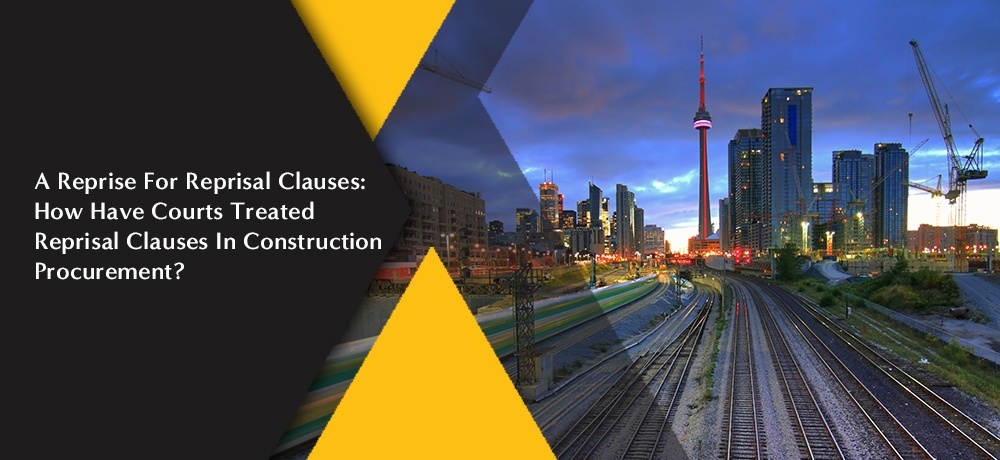A Reprise for Reprisal Clauses: How Have Courts Treated Reprisal Clauses in Construction Procurement?

What are reprisal clauses and what is their effect?
A reprisal clause is a provision in an owner’s procurement documents, or, for a government owner, its by-laws or procurement policy, allowing the owner to reject or exclude any bidders or proponents that are in a dispute with the owner.
A “dispute” for the purposes of a reprisal clause depends on how the clause is drafted, but is often defined broadly to cover litigation, arbitration, and administrative tribunal proceeds. Depending on the language of the clause, it may also cover interim adjudication under the Construction Act and even threatened legal action.
These clauses can be controversial and, when challenged, courts are required to balance the interests of owners and contractors. Owners want the ability to choose which contractors they do business with. This also extends to government and municipal owners, where courts have held that a municipality has essentially the same right as a private businessperson to decide with whom it will do business. On the other hand, contractors may be prejudiced by being excluded from future projects for asserting claims for amounts they legitimately believe are due and owing.
How have courts treated reprisal clauses?
All parties involved in construction procurement should be aware of how the court treats these clauses, whether it is an owner seeking to rely on the clause to exclude a bidder or proponent, or a bidder or proponent who believes they were treated unfairly in a procurement process. Reprisal clauses have been addressed by courts in several provinces, and the clauses have generally been upheld.
In Ontario, the court most recently considered a reprisal clause in the case of Interpaving Limited v City of Greater Sudbury (Interpaving). In Interpaving, the contractor started a lawsuit against the city for damages relating to previous projects. The city then sent a letter to the contractor debarring the contractor from bidding on municipal contracts for four years, pursuant to the city’s procurement by-law. The city also alleged health and safety violations.
The court found the reprisal clause in Interpaving to be valid. The court also found that the city’s failure to provide formal notice to the contractor that the city was proposing to debar the contractor, and the city’s failure to provide the contractor with an opportunity to be heard before the city made the final decision to debar, were breaches of procedural fairness owed to the contractor. However, the court concluded that the city cured the breaches of procedural fairness by reconsidering, even though the city ultimately maintained its decision to debar the contractor.
The British Columbia Court of Appeal addressed a reprisal clause in the case of J. Cote & Son Excavating Ltd. v Burnaby (City) (J. Cote). In this case, the contractor commenced a claim against the city in relation to a contractual dispute on a previous project. The city then added a clause in its procurement documents excluding bids from any contractors involved in legal proceedings against the city during the two years before the date of close of tenders. The contractor challenged the clause, but the court dismissed the challenge, allowing the city to rely on the reprisal clause to exclude the contractor’s bid.
A reprisal clause was also challenged by a contractor in Alberta in the case of Cox Bros. Contracting & Assoc. Ltd. v Big Lakes (Municipal District). In this case, the municipality passed a policy where it would not consider bids from contractors who had started litigation against the municipality. A contractor who was affected by this policy sought the court’s review of the policy. Like the cases of Interpaving and J. Cote, the court also upheld the policy, finding that it was enacted for business purposes and the court should not second guess the municipality’s business decisions.
What you should know from these cases
The key takeaway from these cases is that Canadian courts tend to uphold reprisal clauses that appear in tender documents and in municipal policies. Owners should consider whether to use these clauses and, if so, ensure they are reasonable and implemented for legitimate business purposes. Contractors should carefully review the procurements documents for projects on which they intend to bid and should consider the effects of commencing legal proceedings against owners.
If you are looking for a construction law firm in Toronto and Ontario, please contact Construct Legal. We have experience acting for both owners and contractors in a variety of procurement issues, and much more.
To learn more about why you should hire us, please click here. For more information, please contact Paul Conrod at 647-654-5832 or pconrod@constructlegal.ca or anyone else at Construct Legal.
The information contained in this article is not legal advice.